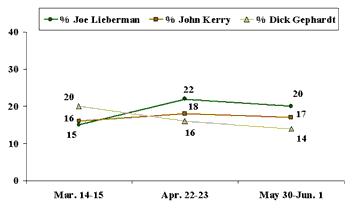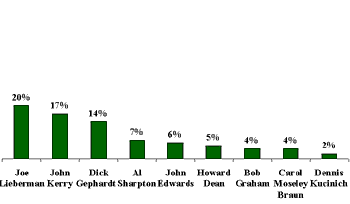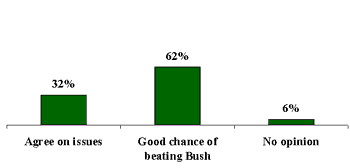GALLUP NEWS SERVICE
PRINCETON, NJ -- A new CNN/USA Today/Gallup survey finds the race for the Democratic presidential nomination still wide open, with no candidate garnering more than 20% of the vote. Three candidates -- Connecticut Senator Joe Lieberman, Massachusetts Senator John Kerry, and Missouri Congressman Dick Gephardt -- receive double-digit support among registered Democrats and Democratic-leaning independents. Although Lieberman technically leads the pack today, it is by only 3 points over Kerry, 20% vs. 17%, which is less than the margin of error for the sample. This is very similar to Gallup's previous trial heat, conducted in April. However, over a slightly longer term (since March), Lieberman has made small gains, mostly to the detriment of Gephardt.
Gephardt attempted to jump-start his campaign in late April by announcing an ambitious healthcare reform proposal. But the latest Gallup Poll, conducted May 30 through June 1, indicates that this move has not yet given Gephardt the momentum he is looking for. If anything, his support appears to be down slightly. He now stands at 14%, compared with 16% in April, and significantly lower than the 20% he recorded in March.
| Democratic Nomination Leaders 2003 Trend in Support Among Democrats and Democratic Leaners Who Are Registered to Vote |
 |
The remaining six national contenders each receive between 2% and 7% of the vote today. The New York-based Rev. Al Sharpton is supported by 7% of potential Democratic primary voters, and North Carolina Senator John Edwards receives 6% of the vote. Vermont Governor Howard Dean is supported by 5%, and Florida Senator Bob Graham, former Illinois Senator Carol Moseley Braun, and Ohio Congressman Dennis Kucinich each receive just 2%-4% of the vote.
| Democratic Presidential Trial Heat Based on Democrats and Democratic Leaners Who Are Registered to Vote |
 |
| May 30-Jun. 1, 2003 |
The Democrats' Dilemma
According to a Washington Post report, Dean rallied liberal Democrats last week, saying, "As long as we're willing to say whatever it takes to get elected, we're going to be in the minority party for a long time." The verbal shot was fired at the more conservative Democratic Leadership Council for purportedly being pro-Iraq war, too pro-defense, and too pro-corporate America.
By contrast with Dean, Democratic voters appear far more pragmatic in their approach to the campaign. When asked which characteristic they would value more if forced to choose, most registered Democrats and Democratic leaners say they would rather see the party nominate someone with a good chance of beating George W. Bush in the general election than nominate someone who shares their views on issues that matter to them.
| Democratic Candidate You Would Prefer: One
Whom You Agree With on Almost All the Issues, or One Who Can Beat
George W. Bush? Based on 403 Democrats or Democratic Leaners Who Are Registered to Vote |
 |
| May 30-Jun. 1, 2003 |
Younger Democratic voters, and particularly younger female voters, are the most likely to be committed to supporting a candidate on the basis of policy rather than electability. Democratic women aged 18-49 are almost evenly divided on this question: 47% would rather see the candidate they agree with be nominated while 50% opt for the candidate with the best chance of beating Bush. A slight majority of Democratic men aged 18-49 favor the candidate with the best chance of winning. By contrast, 70% or more of Democratic men and women aged 50 and older would rather see the party nominate someone who can win than someone they agree with.
|
Preferred Democratic Candidate
Characteristic
|
||||
|
Men |
Women |
Men |
Women |
|
|
% |
% |
% |
% |
|
|
Agrees with you on issues |
39 |
47 |
14 |
22 |
|
Has good chance of beating Bush |
57 |
50 |
74 |
70 |
|
No opinion |
4 |
3 |
12 |
8 |
In spite of Dean's stand, self-described "liberal" as well as "moderate" Democrats are far more likely than "conservative" Democrats to be willing to forsake the ideological candidate of their choice in favor of someone who can win. Roughly two-thirds of liberal and moderate Democrats say they would prefer to see the party nominate someone with a chance of beating Bush, compared with only 45% of conservative Democrats who feel this way.
|
Preferred Democratic Candidate
Characteristic
|
|||
|
Conservative |
Moderate |
Liberal |
|
|
Sample size: |
90 |
197 |
161 |
|
Agrees with you on issues |
47% |
33% |
28% |
|
Has good chance of beating Bush |
45 |
64 |
69 |
|
No opinion |
8 |
3 |
3 |
Perhaps the stakes of unseating a conservative administration are much higher for those furthest away from it on the political spectrum. Thus, in the minds of liberal and moderate Democrats, any Democrat, regardless of his or her specific policy views, would be preferable to Bush. (However, given the relatively small sample sizes of these groups, these findings should be viewed as suggestive rather than definitive.)
Some Historical Perspective
The 2004 Democratic National Convention, to be held in Boston, is now just 13 months away. But the current uncertainty about who will prevail in the Democratic field is nothing unusual for the Democratic Party at this stage of the campaign. In only 3 out of 10 competitive Democratic presidential primary races since 1952 -- meaning open races without a sitting Democratic president seeking re-election -- has a clear Democratic frontrunner emerged prior to the year of the election. The exceptions are Al Gore in the 2000 campaign (running as the sitting vice president), Walter Mondale in the 1984 campaign (running four years after having served as Jimmy Carter's vice president), and Adlai Stevenson, who ran for the second consecutive time in 1956.
In each of the other seven open Democratic races for the nomination, the eventual Democratic nominee was either obscure or in a tight race entering the election year. This includes Stevenson in the 1952 election, John F. Kennedy in the 1960 election, Hubert Humphrey in 1968, George McGovern in 1972, Jimmy Carter in 1976, Michael Dukakis in 1988, and Bill Clinton in 1992. All of these candidates were late bloomers, not emerging as the Democratic frontrunner until somewhere between January and June of the election year.
By contrast, in all nine competitive Republican races since 1952, the eventual Republican nominee was an early frontrunner, and in most (but not all) cases, the candidate held that position consistently through the pre-primary and primary months. This includes Dwight Eisenhower in 1952, Richard Nixon in 1960, Barry Goldwater in 1964, Nixon again in 1968, Gerald Ford in 1976, Ronald Reagan in 1980, George H.W. Bush in 1988, Bob Dole in 1996, and George W. Bush in 2000.
Survey Methods
These results are based on telephone interviews with a randomly selected national sample of 1,019 adults, 18 years and older, conducted May 30-June 1, 2003. For results based on this sample, one can say with 95 percent confidence that the maximum error attributable to sampling and other random effects is ±3 percentage points. The survey includes interviews with 403 registered Democrats or registered independents who lean to the Democratic Party. For results based on this subsample, one can say with 95 percent confidence that the maximum error attributable to sampling and other random effects is ±5 percentage points. In addition to sampling error, question wording and practical difficulties in conducting surveys can introduce error or bias into the findings of public opinion polls.
Next, I'm going to read a list of people who may be running in the Democratic primary for president in the next election. After I read all the names, please tell me which of those candidates you would be most likely to support for the Democratic nomination for president in the year 2004. [ROTATED: Massachusetts Senator, John Kerry, Connecticut Senator, Joe Lieberman, North Carolina Senator, John Edwards, Missouri Congressman, Dick Gephardt, Florida Senator, Bob Graham, Vermont Governor, Howard Dean, the Reverend Al Sharpton, Ohio Congressman, Dennis Kucinich, Former Illinois Senator, Carol Moseley Braun]
NA (NATIONAL ADULTS) BASED ON -- 458 -- DEMOCRATS OR DEMOCRATIC LEANERS
RV (REGISTERED VOTERS) BASED ON -- 403 -- DEMOCRATS OR DEMOCRATIC LEANERS WHO ARE REGISTERED TO VOTE
|
2003 May 30- |
2003 Apr |
2003 Mar |
||||
|
NA |
RV |
NA |
RV |
NA |
RV |
|
|
% |
% |
% |
% |
% |
% |
|
|
Joe Lieberman |
21 |
20 |
23 |
22 |
16 |
15 |
|
John Kerry |
16 |
17 |
17 |
18 |
16 |
16 |
|
Dick Gephardt |
14 |
14 |
15 |
16 |
19 |
20 |
|
Al Sharpton |
7 |
7 |
3 |
3 |
6 |
5 |
|
John Edwards |
7 |
6 |
9 |
8 |
7 |
6 |
|
Howard Dean |
5 |
5 |
6 |
6 |
5 |
5 |
|
Bob Graham |
4 |
4 |
5 |
5 |
4 |
4 |
|
Carol Moseley Braun |
3 |
4 |
4 |
4 |
7 |
8 |
|
Dennis Kucinich |
3 |
2 |
3 |
3 |
3 |
3 |
|
Other |
1 |
1 |
1 |
1 |
1 |
1 |
|
No One |
4 |
5 |
5 |
5 |
3 |
3 |
|
No Opinion |
15 |
15 |
9 |
9 |
13 |
14 |
|
(NA) National Adults |
||||||
|
(RV) Registered Voters |
||||||
Which type of candidate would you prefer to see the Democrats nominate for president in 2004 – [ROTATED: a candidate who agrees with you on almost all of the issues you care about but does not have a good chance of beating George W. Bush, (or) a candidate who has a good chance of beating George W. Bush, but who does not agree with you on some of the issues you care about]?
BASED ON -- 458 -- DEMOCRATS OR DEMOCRATIC LEANERS
|
|
Good chance |
No |
|
|
2003 May 30-Jun 1 |
33% |
61 |
6 |
BASED ON -- 403 -- DEMOCRATS OR DEMOCRATIC LEANERS WHO ARE REGISTERED TO VOTE
|
|
Good chance |
No |
|
|
2003 May 30-Jun 1 |
32% |
62 |
6 |
